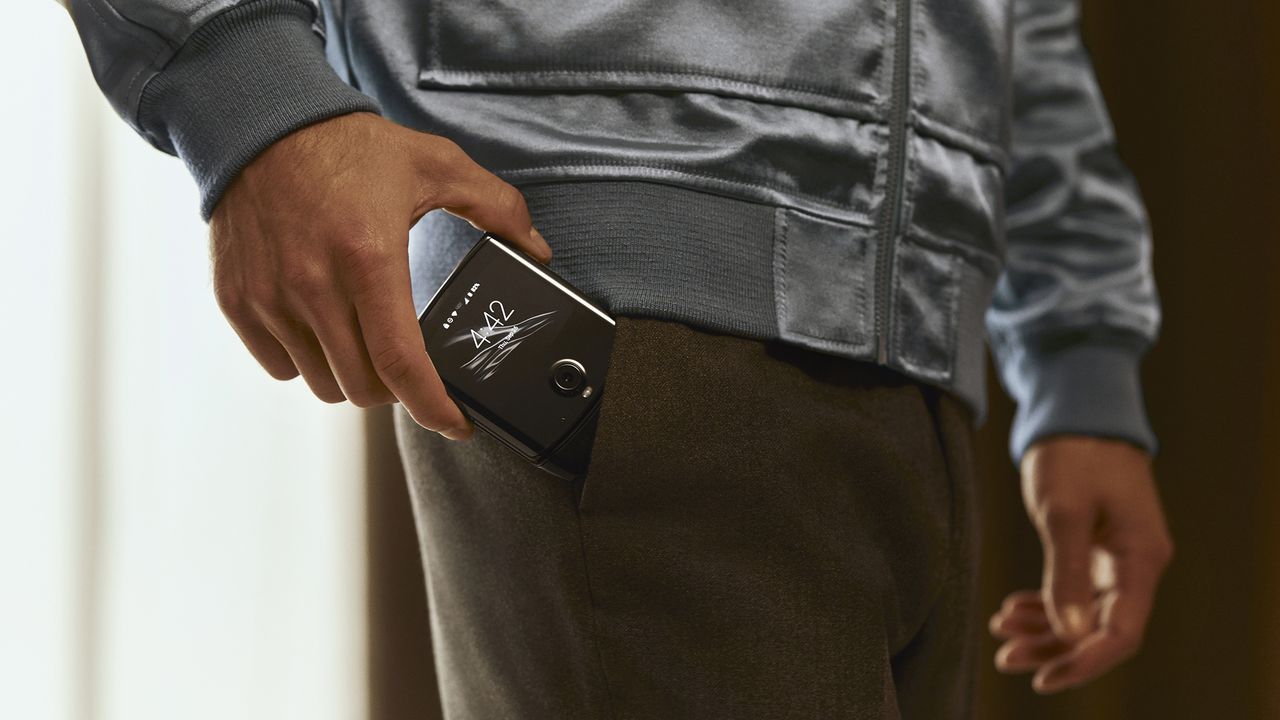

After months if not years of rumours and speculation, the Motorola Razr, which was a household name in the mid-00s at the height of the popularity of flip-phones, is back.
It's had a 2020 reboot from Motorola and was launched on Wednesday, 13 November 2019 at an event in Los Angeles. The specs are now known, as is the price, the countries it will go on sale in, and some of the networks that will be carrying it.
Our thoughts on the modern-retro clamshell are below, but first why not check out this hands-on 2020 Motorola Razr review video from our colleagues at TechRadar?
2020 Motorola Razr price and availability
Motorola Razr pre-orders went live in the UK on EE on Wednesday 22 January with prices starting at £94 a month with an up-front cost for the phone of £100. That gets you 10GB of data on a 24-month contract. EE says people who place pre-orders can expect despatch within 28 days.
Pre-order the new Motorola Razr from EE here
In the US, pre-orders will be available on contract at Verizon starting on 26 January while the phone will be out on 6 February. The US Motorola Razr price is $1,499.99, or $62.49/month on a 24-month contract. It will also be available unlocked from Walmart and on Motorola.com.
Pre-order the new Motorola Razr from Verizon here
Sign up to the T3 newsletter for smarter living straight to your inbox
Get all the latest news, reviews, deals and buying guides on gorgeous tech, home and active products from the T3 experts
Buy the Motorola Razr from Motorola.com
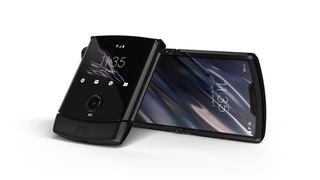
Should you buy the 2020 Motorola Razr?
Let's be clear: if you're parting with $1,500 for this phone, you're paying for the looks and the R&D work that has gone into that folding screen and not for cutting-edge components.
For such an expensive phone, the 2020 Motorola Razr specs are rather underwhelming, meaning this is a phone aimed squarely at buyers who want the modern retro look and are prepared to sacrifice the latest hardware features.
If you were to line up the new Motorola Razr against either the Samsung Galaxy Fold or the Huawei Mate X in a specs battle it would be soundly beaten, so we'll just list those specs below rather than pitch the 2020 Motorola Razr in a side-by-side comparison, because this is a phone that will sell on its looks and not its specs.
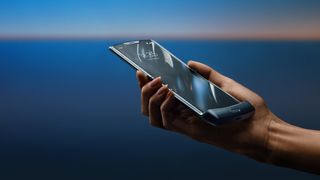
Below are the key specs for the new Razr.
- Main internal folding screen: 21:9 aspect ratio, 2142 x 876 pixels, 6.2-inch POLED (plastic OLED)
- Front screen: 4:3 aspect ratio, 800 x 600 pixels, 2.7-inch GOLED (glass OLED)
- 16MP main camera, f/1.7 aperture (no ultra-wide lens or zoom lens)
- 5MP front-facing camera
- Qualcomm Snapdragon 710 processor
- 6GB RAM
- 128GB storage
- 2510mAh battery capacity
- Android 9
- 15W TurboPower fast-charge
- Fingerprint scanner on the front in the bottom 'chin'
- Speakers also mounted in the front chin
- One USB-C slot on the bottom of the phone
- No expandable storage slot
- No SIM slot (the phone uses eSIM)
- No headphone jack
- No wireless charging

The camera is definitely not class-leading, the processor is upper mid-range and the battery capacity is on the small side (it's even smaller than the Google Pixel 4, which we criticised for having middling battery life). It's also worth noting that while the screen folds, you don't actually get any more screen than you do on a non-folding smartphone, unlike the Galaxy Fold and the Huawei Mate X which offer big-screen tablet modes. Oh, and it doesn't ship with the latest version of Android.
On the upside, the phone folds down to be small enough to fit in the pockets of most jeans (which can be a challenge with many of today's phones) and, when folded, that screen is protected from potential scratches and other damage. The secondary screen on the outside of the device is a really nice touch which enables you to view notifications without having to open the handset. And, it can't be denied, the phone definitely looks very cool.
So should you buy it? If you want powerful handset that rocks the best camera, the fastest processor and a massive battery, then no. But if you want a phone that will turn heads, start conversations and that looks cool – and you have $1,500 to spare – then sure, consider the Motorola Razr.
We'll reserve our judgement until we've spent a few days with the handset and given it an in-depth review. Stay tuned...

If you like big notches in your phone screen then the Motorola Razr has you covered
If you are thinking about buying a clamshell phone, you might also want to wait to see if Samsung's new handset concept makes it into production as that could well steal the Motorola Razr's thunder.
Samsung's concept was shown on 29 October 2019, when the company took to the stage at the Samsung Developers Conference to tease its own clamshell phone. Unlike the Galaxy Fold, which folds on a vertical axis, the new concept phone folds on its horizontal axis, exactly like the Motorola Razr. Dutch site LetsGoDigital took the presentation slide and mocked up a gorgeous 3D model which you can see below.
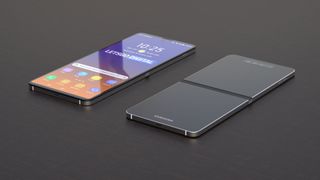
It's not clear whether the Samsung concept would feature a second, smaller screen on the front, as the new Razr has, or whether Samsung will even put this phone into production but the very appearance of this concept is sure to have caused a few worries at Motorola HQ.
The original article, packed full of leaks and rumours that broke in the months leading up to the 13 November unveil, continues below...
The return of the Razr became certain in mid-April 2020, when the new Motorola Razr was officially confirmed as existing and indeed called the "Motorola Razr" in an official Bluetooth certification body listing, which also confirmed that the phone would use Bluetooth 5.0 technology.
The re-imagined handset had been rumoured to be incoming ever since the hugely-successful relaunch of the Nokia 3310 two years ago, and will apparently combine the hinged design of the original 2004 flip-phone with a new folding OLED display.
The addition of a foldable display means the new Motorola Razr will compete directly with the likes of the Huawei Mate X, the Samsung Galaxy Fold, and the unnamed (and so far unreleased) dual-folding Xiaomi.
Motorola Razr design and features
Motorola is expected to keep the same industrial design of the original July 2004 Razr V3, albeit with a very modern twist. The schematics of the as-then unannounced Motorola-branded smartphone, now widely-believed to be the 2020 rebirth of the Motorola Razr, were spotted in a patent filing late last year.
These illustrations have since been transformed into a series of stunning high-resolution renders, as well as a glossy new concept video. Based on both, the new Razr will keep the iconic flip phone design seen on the original handset, as well as the secondary screen on the outside of the casing for notifications.
Then on 31 October 2019, a leaked image of the 2020 Motorola Razr broke cover. The picture was tweeted by leakster Evan Blass and can be seen below. How modern-retro cool does that look?
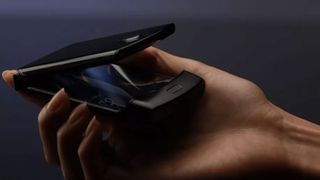
Just a few minutes later, a new series of Motorola Razr 2020 images leaked and then on Friday 1 November, a THIRD successive leak saw a hands-on image of the new Razr hit the internet courtesy of Mobile news site DroidShout.

That was followed by a fourth leak just a few hours before the 13 November launch event where images that were posted to the website of the US Federal Communications Commission (FCC) were spotted by Mysmartprice. They're not the clearest of images but they do show the new handset in its folded and unfolded form and they match earlier leaks, leading us to believe that these are genuine.
What can just about be seen in these new images is a probable rear-mounted fingerprint sensor on the back beneath a Motorola logo, a camera on the rear, and a USB-C port on the bottom of the handset. What's missing from the handset is a headphone jack and, although the pics are low res, we can't see a front-facing selfie camera on the phone.
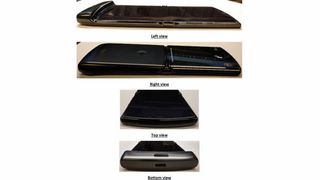
Open up the new Motorola Razr and you can see just how the design has changed from the original. According to the patent schematics and rumours from the supply chain, the new Razr will have a foldable OLED display that runs the length of the handset and that's what the leaked images confirm.
While the Razr will still have a hinge, it will be hidden from view by the pliable display whenever you're using the smartphone. When the rebooted smartphone is open, it is expected to have an expansive screen with a widescreen aspect ratio so that you can watch the latest blockbusters without any of those troublesome black bars.
Like the iPhone XS Max and Pixel 3 XL before it, Motorola will use a notch at the top of the screen for the earpiece, and probably a selfie-camera, though that selfie camera is looking a bit doubtful based on the latest leaked images shown above.
Based on the schematics included in the latest patent from Motorola, and confirmed in the leaked images, there will be a single rear-mounted camera, as well as a fingerprint scanner just below it. Motorola recently moved every model in its new Moto G7 range to a rear-mounted fingerprint scanner to increase the size of the display.
According to a report from XDA Developers, this external screen will not be able to run every Android app installed on your smartphone. Instead, Motorola is believed to be limiting the touchscreen to a select few system apps, like Moto Display, Moto Actions, and the Moto Camera app. That is a very different approach to the Samsung Galaxy Fold, which treats its 4.6-inch so-called Cover Display as a traditional smartphone screen that runs anything the larger folding screen can – albeit it's limited to two app multi-tasking, not three like the 7.3-inch Flex Display.
As well as core system apps, the external display on the Motorola Razr can be used to show up to six Quick Settings tiles. These will be similar to those in the dropdown available at the top of the display on all Android smartphones and will allow users to quickly toggle Airplane mode and the like without interrupting whatever they're doing on the main screen. According to XDA Developers, it’s unclear whether Motorola will allow users to scroll to see more than the six tiles displayed on the screen at any one time.
Elsewhere, whenever the Google Assistant is triggered with the wake phrase "OK, Google" or "Hey Google" while the Razr is flipped close, the Assistant animation will be shown on the external display to notify users that the handset has heard the command. This option can be disabled in the settings, in which case the user will simply be prompted to “flip open to unlock” with a passcode, pattern or PIN.
XDA Developers believes that users will be able to set separate wallpapers for the main foldable display and the smaller touchscreen on the outside of the clamshell.
Apparently, Motorola also experimented with putting the folding screen on the outside of the device (as in this concept video) but the company seems to have abandoned that approach. When asked whether the product would be similar to the Huawei Mate X design, which has the foldable screen on the outside of the device, Motorola's Dan Dery said: "We have been testing a plastic OLED device with plastic film on top. The fact that you're touching [that kind of display] with your nails is scratching it. It has a short life right away; it starts dying the day you unpack it. But it's beautiful. That first day, it's beautiful."
Motorola Razr specs
In terms of specifications, it seems the new Motorola Razr will not have anywhere near the same processing grunt as rival foldable phones like the Huawei Mate X and Samsung Galaxy Fold. According to a report from XDA Developers, the new Motorola will employ the Qualcomm Snapdragon 710 system-on-a-chip coupled with 4GB of RAM and 64GB of storage. A model with 6GB of RAM and 128GB of storage will also be available, it claims.
Although this chipset does support Qualcomm's Quick Charge 4+ technology, we don’t yet know what kind of fast charging the Motorola Razr will offer. However, we have heard that Motorola will kit out its bendy blower with a 2,730mAh battery cell.
That's significantly smaller than the battery in the Mate X and Galaxy Fold. However, the Motorola Razr is a smaller device, so shouldn't have a negative impact on the battery life of the handset. We can't believe Motorola would fit its flagship foldable with anything other than all-day battery life, especially given its emphasis on battery with the recent Moto G7 series.
The latest Motorola Razr spec leaks come from XDA Developers Editor-in-Chief Mishaal Rahman, who on 1 November 2019 tweeted a summary of "basic Motorola Razr specs":
* sdm710, likely Qualcomm Snapdragon 710
* Main display: 6.20" 2142x876 by BOE
* Closed display: 2.69" 800x600 also by BOE
* 4/6GB RAM
* 64/128GB storage
* Now believed to have 2510mAh battery
Those specs pretty much align with earlier leaks although the battery size, if correct, is now even smaller, at 2,510mAh.

Illustrations from the Motorola patent, first reported by GSM Arena, reveal a detailed look at the Razr's form factor
Motorola Razr official press images
On Sunday 28 April 2019, images purporting to be official press renders of the 2020 Motorola Razr briefly appeared on Chinese social networking site Weibo before being quickly pulled down. They were then reposted to Slashleaks.
The images show the folding phone leaning against its prism-shaped packaging. A second image shows the contents of the packaging, which seem to be a wireless charger, a USB-A to USB-C cable, a USB-C-to-3.5mm audio cable (which suggests that there will be no headphone jack on the new Razr), earbuds andthe Motorola Razr V4.
Are they genuine? To us, these renders look decidedly non-luxurious for a phone that is expected to cost in the region of $1,500. So if they are actually from Motorola, or a company acting on its behalf, they're most likely early rough renders that were never intended to see the light of day.

Something doesn't look quite right about these so called "official renders"
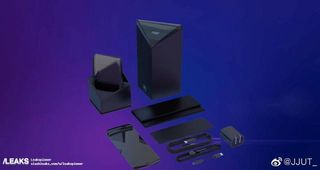
The contents of the box may be accurate but we'd expect the official press images to be slicker than this

Paul Douglas is Global Digital Editorial Strategy Director at Future and has worked in publishing for over 25 years. He worked in print for over 10 years on various computing titles including .net magazine and the Official Windows Magazine before moving to TechRadar.com in 2008, eventually becoming Global Editor-in-Chief for the brand, overseeing teams in the US, UK and Australia. Following that, Paul has been Global Editor-in-Chief of BikeRadar and T3 (not at the same time) and later Content Director working on T3, TechRadar and Tom's Guide. In 2021, Paul also worked on the launches of FitandWell.com and PetsRadar.
-
 You only have days to catch this sci-fi stunner - it's leaving Netflix soon
You only have days to catch this sci-fi stunner - it's leaving Netflix soonA Quiet Place: Part II is terrifying
By Max Freeman-Mills Published
-
 I watched the most beautiful movie with no dialogue and now I'm speechless
I watched the most beautiful movie with no dialogue and now I'm speechlessFlow is a gorgeous animation with no words whatsoever – a must to stream
By Mike Lowe Published